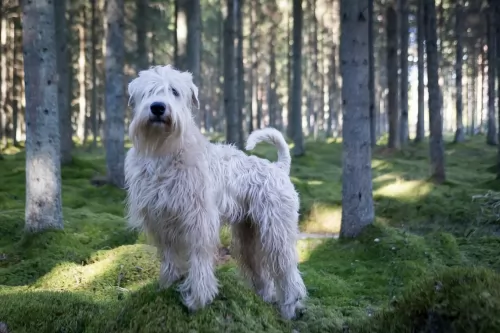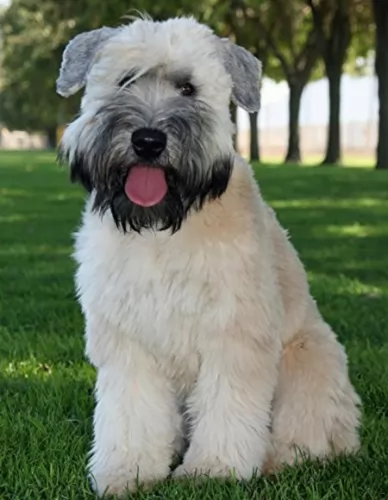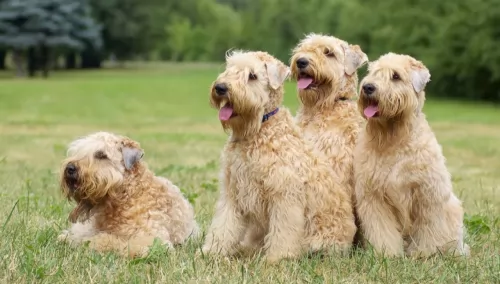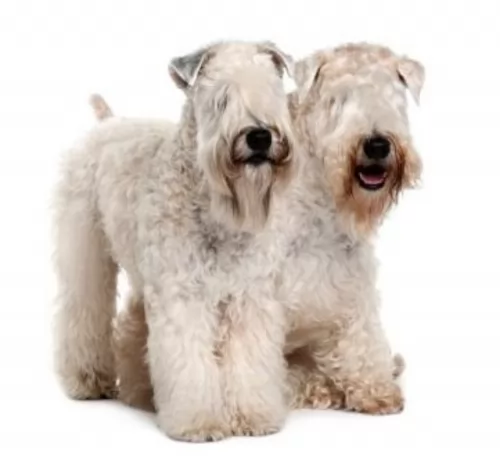 Petzlover
Petzlover Both English Foxhound and Soft-Coated Wheaten Terrier are originated from United Kingdom. English Foxhound may grow 14 cm / 6 inches higher than Soft-Coated Wheaten Terrier. English Foxhound may weigh 12 kg / 27 pounds more than Soft-Coated Wheaten Terrier. Both English Foxhound and Soft-Coated Wheaten Terrier has almost same life span. Both English Foxhound and Soft-Coated Wheaten Terrier has almost same litter size. English Foxhound requires Low Maintenance. But Soft-Coated Wheaten Terrier requires Moderate Maintenance
Both English Foxhound and Soft-Coated Wheaten Terrier are originated from United Kingdom. English Foxhound may grow 14 cm / 6 inches higher than Soft-Coated Wheaten Terrier. English Foxhound may weigh 12 kg / 27 pounds more than Soft-Coated Wheaten Terrier. Both English Foxhound and Soft-Coated Wheaten Terrier has almost same life span. Both English Foxhound and Soft-Coated Wheaten Terrier has almost same litter size. English Foxhound requires Low Maintenance. But Soft-Coated Wheaten Terrier requires Moderate Maintenance
 The English Foxhound was found in Great Britain as far back as the late 1700’s. They were bred to be scent hounds and hunt the fox by following his smell. It was a crossing of several different types of hounds that produced the English Foxhound. This included the Greyhound, the Bulldog and the Fox Terrier. It was perceived that there were not a lot of deer left in the United Kingdom to be hunted for both sport and food. So, a new dog would be needed instead for the Staghound and Deerhound.
The English Foxhound was found in Great Britain as far back as the late 1700’s. They were bred to be scent hounds and hunt the fox by following his smell. It was a crossing of several different types of hounds that produced the English Foxhound. This included the Greyhound, the Bulldog and the Fox Terrier. It was perceived that there were not a lot of deer left in the United Kingdom to be hunted for both sport and food. So, a new dog would be needed instead for the Staghound and Deerhound.
The Foxhound was developed as a pack animal bred to chase the fox followed by hunters on horses. The Foxhound was bred with incredible stamina, a great ability to follow scents, track prey, and act as a watchdog as well. This breed are pack animals. They hunt in packs and prefer to live in packs. A solitary English Foxhound is probably not a happy Foxhound. The English Foxhound is stockier and slower than his cousin the American Foxhound. The English Foxhound is recognized by the AKC and UKC. In 2012 the International Foxhound Association was developed to promote the English Foxhound.
 This wheaten colored terrier hails from Ireland. Although the Wheaten has been around for a long time, it was in 1937 that he was recognized as a breed in Ireland.
This wheaten colored terrier hails from Ireland. Although the Wheaten has been around for a long time, it was in 1937 that he was recognized as a breed in Ireland.
The British Kennel Club also recognized the Wheaten and the dog was also exported to the United States. Serious interest started being shown for the Terrier in the 1970s. It was in 1973 that they were recognised by the American Kennel Club.
 The English Foxhound is a superb athlete who can run for hours without a break. He has muscular, sturdy and straight legs with round paws. His chest is deep, and his back is level. Their head is wide, and the muzzle is long with 16 inches in the front of the ears. The nose is long, and those ears are set low. They can be many colors as long as it is a “hound” color of tan, tricolor, black and white, or red.
The English Foxhound is a superb athlete who can run for hours without a break. He has muscular, sturdy and straight legs with round paws. His chest is deep, and his back is level. Their head is wide, and the muzzle is long with 16 inches in the front of the ears. The nose is long, and those ears are set low. They can be many colors as long as it is a “hound” color of tan, tricolor, black and white, or red.
 The Wheaten is a medium sized dog standing at between 43 and 50cm and weighing between 13 and 20kg both male and female. The coat of the dog is soft, silky and wavy to even curly and is a wheaten to ginger color.
The Wheaten is a medium sized dog standing at between 43 and 50cm and weighing between 13 and 20kg both male and female. The coat of the dog is soft, silky and wavy to even curly and is a wheaten to ginger color.
The coat of the puppy is dark but as he grows up it changes into the wheaten color although the ears may be a dark brown color. Pet owners like that the Wheaten is a very low shedding dog.
Playful, social and friendly, the Wheaten has always been put to good use on the farm. These days he is pet and companion. He is energetic and playful so children love having him around.
He is slightly more hyper and energetic than other Terrier breeds so will require a good dose of exercise.
He is smart and strong willed, and training and socialization turns him into an amicable pet to have around, so much so that he is sought after as a therapy-dog.
They’re easy-going dogs with no aggression issues but they still make great watch dogs and want to do whatever it takes to look after- and protect their human family.
 The English Foxhound gets along with other dogs and like people. He was bred to be a pack animal, not a loner. He will get along with most any other animal and children as well. However, they are not often kept as pets because their prey drive and pursuit drive are so strong that nothing else matters. The chase is what life is all about for this breed. They are hardwired for it. They are not easy to train because they are constantly distracted by smells and movements that could send them off on the chase.
The English Foxhound gets along with other dogs and like people. He was bred to be a pack animal, not a loner. He will get along with most any other animal and children as well. However, they are not often kept as pets because their prey drive and pursuit drive are so strong that nothing else matters. The chase is what life is all about for this breed. They are hardwired for it. They are not easy to train because they are constantly distracted by smells and movements that could send them off on the chase.
Keep them on a lease when walking them so they don’t go wandering or running of. They love to run, and they love to talk – bay actually. They might slow down somewhere around 8-10 years old. They need a strong owner and a lot of exercise to be happy.
 The Soft Coated Wheaten Terrier has always made an excellent farm dog, but today he is more suited as pet and companion.
The Soft Coated Wheaten Terrier has always made an excellent farm dog, but today he is more suited as pet and companion.
He adapts easily to life in the city or the countryside. Wherever he is, he will need his exercise. He also longs to be an active part of his human family, and then he’s happy, lively, social and friendly and is a great playmate for children.
 When you bring a Wheaten Terrier into your home, you’re not likely to have too many vet fees as he tends to be a healthy dog breed, being able to reach 13, 14 or 15 years of age with good care.
When you bring a Wheaten Terrier into your home, you’re not likely to have too many vet fees as he tends to be a healthy dog breed, being able to reach 13, 14 or 15 years of age with good care.
Look out for a dog ailment known as Protein-losing enteropathy (PLE). This is a condition where the dog isn’t able to properly absorb protein in the digestive tract, so that it is passed in their stools.
It can be fatal, but if caught early, some dietary changes can keep it under control.
Also, look out for inflammatory bowel disease. This disease occurs when the stomach of the dog has a large number of inflammatory cells which can change the lining of the digestive tract, preventing the normal absorption of food.
 The English Foxhound is a high energy dog that needs a high quality dog food. He should be fed about 2.5 -3 cups a day in two meals of dry food. Because he is a deep chested dog, beware of bloat and don’t feed large meals, particularly before or after strenuous exercise.
The English Foxhound is a high energy dog that needs a high quality dog food. He should be fed about 2.5 -3 cups a day in two meals of dry food. Because he is a deep chested dog, beware of bloat and don’t feed large meals, particularly before or after strenuous exercise.
Seizures are caused by epilepsy, but they can be treated, and the dog can have a quality life.
When the stomach becomes distended or twisted. Can result in death if not treated immediately.
The English Foxhound’s long, floppy ears are prone to infection and allergies. Inspect and clean them regularly.
The English Foxhound is an easygoing canine, but he has an incredible energy level and needs a lot of exercise every day. In fact, if you are not going to hunt then don’t get a Foxhound. It is not fair to the dog. Of course, if you have acres of land and are into agility, tracking, coursing and rally then this might be the dog for you. But if the English Foxhound does not get enough daily exercise, he will not be a good house pet. This dog was bred to run for miles. You cant keep him cooped up in your house.
 Brush your pet’s silky coat twice a week. Such a silky coat can get all tangled and matted. If you prefer, many people opt to rather have the Wheaten’s coat professionally clipped as then it is easier to handle. They like to have the hair clipped that hangs over the dog’s eyes.
Brush your pet’s silky coat twice a week. Such a silky coat can get all tangled and matted. If you prefer, many people opt to rather have the Wheaten’s coat professionally clipped as then it is easier to handle. They like to have the hair clipped that hangs over the dog’s eyes.
Other grooming tasks require you to check inside his ears for redness which could indicate an infection. Trim his nails and check him over for ticks and fleas.
Have your Wheatie trained and socialized as he is a stubborn dog breed and you want him to be well mannered and obedient.
Terriers like this are energetic dogs and he is going to need exercise every day. A walk for a dog is always a welcome experience as it gives him the opportunity to sniff around and pick up new smells. Play ball- or frisbee games with him as this can tire him out a bit.
If your dog shows signs of illness, get him to the vet. He is such a feisty dog that it can be unbearable to see him out of sorts.
Terriers are energetic dogs so if you feed your dog one of the commercial dog foods, make sure the label indicates what food it is. This is because the foods are manufactured according to the type of dog it is, its age, size and energy levels.
Always try and go for the high quality foods which don’t have all those unhealthy ingredients in them. Try to include some home-made food – nothing exotic and spicy – just plain, wholesome food that won’t upset his stomach.
Boiled chicken, brown rice or pasta and spinach, sweet potatoes and carrots is super tasty and nutritious. You can chop it up and add it to your pet’s kibble twice a week.
Try and include a little bit of raw meat to his diet occasionally as this can go towards ensuring he doesn’t get skin diseases. Always ensure he has a constant supply of fresh, cool water available.